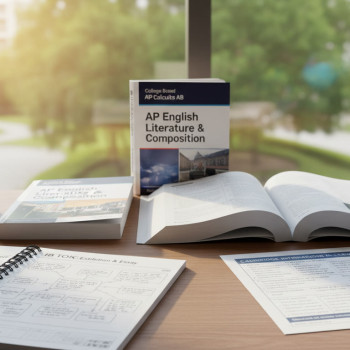Why AP Courses Matter for International Applicants
If you’re an international student eyeing universities in the United States or the United Kingdom, Advanced Placement (AP) courses are one of the clearest ways to show academic readiness, intellectual curiosity, and preparation for college-level work. AP exams are recognized around the globe; they can help you earn credit, gain advanced placement, and — crucially for admissions officers — demonstrate your ability to handle rigorous, content-rich classes.

But AP isn’t only about credit. For admissions teams, especially at selective US and UK schools, AP choices are a signal. They reveal what you love, how deep you’ve gone, and whether your high school curriculum challenged you. Thoughtful AP planning — not just taking every class available — can make your application coherent, compelling, and competitive.
Two Big Benefits to Keep in Mind
- Admissions Narrative: Strategic AP selections tell a story. A cluster of STEM APs suggests mathematical or scientific commitment; AP Seminar plus AP Research (Capstone) showcases investigative and writing skills.
- Academic Leverage: High AP scores can translate to college credit or allow you to skip introductory courses. That can free time for majors, minors, research, or internships — all attractive on a transcript.
How US and UK Admissions View APs Differently
Admissions processes in the US and UK share the same goal — find prepared, motivated students — but they read AP results differently because the systems themselves differ.
United States
US admissions officers evaluate the whole application: transcript, recommendations, essays, extracurriculars, and test scores. APs fit two main roles here:
- Signal of Rigor: Schools expect applicants from strong programs to take the most challenging courses available. High AP enrollment demonstrates that you sought rigor.
- Credit and Placement: Many US colleges grant credit or allow you to skip introductory classes based on AP exam scores. Even if a college doesn’t grant credit, they still like to see students who’ve attempted college-level work.
United Kingdom
UK universities (particularly those using UCAS) focus more heavily on predicted grades, subject depth, and examinations. For many UK admissions tutors, APs are supplemental evidence — useful, respected, and sometimes used for credit, but rarely the central deciding factor.
- Specificity Matters: For subject-focused courses (e.g., Engineering, Economics, Natural Sciences), relevant APs can strengthen your academic fit.
- Complementary Profile: Because UK offers often hinge on specific A-level or equivalent subjects, APs show that you have the background to succeed, even if the university expects A-levels.
Choosing APs: Strategy Over Quantity
Students sometimes fall into the trap of believing more APs equals better. That’s not always true. Admissions officers prefer depth and consistent excellence over a long list of middling attempts. Here’s how to build a purposeful AP plan.
Step 1 — Anchor Your Application With 2–3 Core Subjects
Pick two or three areas that align with your intended major and take your strongest AP courses in those areas. For example:
- If you want Computer Science: AP Calculus AB/BC, AP Computer Science A, AP Physics C (if available).
- If you want Economics: AP Microeconomics, AP Macroeconomics, AP Calculus AB, AP Statistics.
- If you want English or Humanities: AP English Language and Composition, AP English Literature, AP History options (World, European, or US) and AP Seminar/Research.
Step 2 — Add One or Two Complementary Courses
Complementary APs round out your profile and show intellectual curiosity. A biology applicant taking AP Statistics or AP Environmental Science demonstrates interdisciplinary thinking. A potential business major with AP Psychology and AP Statistics looks well-rounded.
Step 3 — Prioritize Performance Over Prestige
It’s better to take fewer APs and score 4–5 than to overload and get 2s and 3s. Consistently strong scores signal mastery; inconsistent results suggest overreach. Admissions officers read scores in the context of what was available at your school — if APs are rare, admissions officers notice that effort even more.
AP Capstone and AP Research: A Distinctive Advantage
AP Capstone (Seminar + Research) is uniquely valuable for international applicants. These courses develop research, argumentation, and presentation skills — competencies that matter in both US and UK higher education.
- AP Seminar teaches analysis, argumentation, and collaboration.
- AP Research culminates in a yearlong independent project — an excellent supplement to a personal statement or admissions interview because it provides concrete evidence of scholarly initiative.
If your school offers AP Capstone, it’s an excellent way to differentiate your profile, especially if your intended field values research and writing. Mentioning a strong AP Research project in your personal statement can make your application more memorable.
Practical Course Selection Table: Typical Majors and Recommended APs
| Intended Major | Primary APs (Must-Haves) | Complementary APs (Recommended) |
|---|---|---|
| Computer Science | AP Calculus AB/BC, AP Computer Science A | AP Physics C, AP Statistics, AP Physics 1 |
| Engineering | AP Calculus BC, AP Physics C | AP Chemistry, AP Statistics |
| Biological Sciences | AP Biology, AP Chemistry | AP Statistics, AP Calculus AB, AP Environmental Science |
| Economics | AP Microeconomics, AP Macroeconomics | AP Calculus AB, AP Statistics |
| Humanities and Social Sciences | AP English Language or Literature, AP History (World or European) | AP Psychology, AP Seminar/Research, AP Languages |
Timing Your APs: When to Take Exams and Why It Matters
Timing matters for both admissions and your own learning. Here’s a pragmatic timeline most international applicants find useful.
Junior Year (or Year Before Application Year)
- Take your most challenging APs — admissions committees like to see strong performance in the year before application.
- Use AP scores to show subject mastery in areas central to your intended major.
Senior Year
- Continue with one or two APs, especially if they directly support your major. Avoid overloading your final year; colleges will see senior-year course rigor and want to know you can sustain it.
- Remember the logistics: AP exams are in May. Some colleges ask for AP scores early, so plan your score-send accordingly.
How to Use AP Results in Your Application Materials
Your AP scores and coursework should be woven naturally into essays, subject supplements, and interviews. Here are practical ways to incorporate them.
Personal Statement
Use a specific AP experience or project to illustrate intellectual curiosity. A compelling angle: describe a challenge in an AP course that sparked a research question or inspired an independent project (for example, an AP Research investigation that later informed your intended major).
CVA and Interviews
When interviewers ask about academic interests, mention APs that shaped your thinking. Be concrete: cite a lab experiment in AP Chemistry that altered your perspective or an AP Economics concept you applied to a community project.
Supplemental Essays (UK Personal Statements)
UK personal statements are subject-focused and compact. Use AP courses and exam topics as proof points — they show you have relevant foundational knowledge and the capacity for university study.
AP Scores, Credit, and Placement: What to Expect
Policies vary by institution, but a few general truths hold:
- Many US colleges award credit or placement for scores of 4 or 5; some grant credit for 3s. UK universities may accept AP scores as evidence of subject knowledge or offer credit in some cases, but it’s less uniform.
- Even if a school doesn’t award credit, high AP scores still convey academic strength to admissions officers.
Don’t treat APs as a guaranteed shortcut to an advanced standing; view them primarily as preparation and proof of readiness.
Real-World Examples: Building a Cohesive Application
Example 1 — STEM-Focused Applicant
Jia is applying to US universities for Electrical Engineering. In junior year she took AP Calculus BC, AP Physics C, and AP Computer Science A, scoring 5, 4, and 5 respectively. Her AP Research project that senior year explored sensor optimization algorithms — a neat bridge between coursework and independent research. On her application she framed AP choices as deliberate preparation for engineering demands and highlighted the research project in her supplemental essay. Admissions officers saw both mastery and the ability to apply knowledge creatively.
Example 2 — Humanities-Focused Applicant
Ahmed plans to study History in the UK. He focused on AP World History, AP English Literature, and AP Seminar. In his personal statement he used a seminar project — an analysis of primary sources on migration patterns — to demonstrate his archival curiosity and analytical writing ability. The combination of relevant APs and a focused project helped make a persuasive, subject-centered case for his suitability for History programs.
Study Tips and Practical Prep (What Actually Works)
AP exams reward understanding more than memorization. Here are tried-and-true strategies to improve your AP performance and make the learning stick.
- Practice with Real Questions: Use released exam questions and AP Classroom resources to understand exam structure and grading expectations.
- Plan Backwards: Set a target score, map the skills and content you need, and build a weekly study plan. Quality practice beats cramming.
- Practice Writing: For essay-based APs (History, English), practice timed responses and iteratively improve with feedback.
- Use Collaborative Review: Study groups can help, especially for problem-solving APs where discussing approaches clarifies concepts.
- Simulate Test Conditions: Take several full-length practice exams under timed conditions to build stamina and pacing skills.
How Personalized Tutoring Can Help — When It Fits
Personalized tutoring can be a game-changer when used strategically. If you’re balancing schoolwork, national exams, and AP prep across different curricula, a tailored approach helps you focus on high-impact skills. For example, Sparkl’s personalized tutoring offers 1-on-1 guidance, tailored study plans, expert tutors, and AI-driven insights that can identify your strongest improvement areas and streamline revision. This kind of support is especially valuable for writing-intensive APs and for students preparing AP Research projects who need sustained mentorship.
Common Mistakes International Applicants Make
- Overloading Without Depth: Taking many APs but performing inconsistently dilutes impact.
- Ignoring Fit: Choosing APs because they look impressive rather than because they align with interests.
- Missing Deadlines: AP score reporting windows and university deadlines don’t always align; plan your free score send and additional reports early.
- Underusing AP Projects: Not converting AP Research or seminar projects into application material (essays, portfolios, interviews).
Checklist: Final Steps Before You Apply
- Confirm which AP scores each university accepts for credit or placement and whether they have subject-specific preferences.
- Decide which AP scores to send — use the free score send each year but be mindful of deadlines.
- Turn AP Research and major projects into clear, concise anecdotes for essays and interviews.
- Maintain strong senior-year courses; admissions officers care about continued rigor.
- Consider targeted tutoring for weak areas or for polishing essays and research presentations.

Final Thoughts: Make APs Serve Your Story
Think of AP courses as instruments, not trophies. The most convincing applications aren’t lists of impressive-sounding courses — they are narratives that show coherent academic direction, evidence of mastery, and a readiness to contribute to university communities. Choose APs that align with what you love, perform consistently, and use projects and scores as fuel for essays and interviews.
If you need help tailoring a plan, consider flexible, personalized support. Working with a tutor who understands AP expectations and international admissions — someone who can help you craft a study plan, review essays, and translate AP work into admissions assets — can pay dividends. Sparkl’s model of 1-on-1 guidance, tailored study plans, expert tutors, and AI-informed feedback can be particularly effective for students juggling multiple systems and deadlines.
Above all, stay curious. The strongest applications come from students who pursue subjects with genuine interest and show, with APs and beyond, that they’ve done the intellectual work to thrive in university-level study.
Quick Takeaways
- Prioritize depth: 2–3 subject areas with strong AP performance beat a long list of weak attempts.
- Use AP Research and Capstone strategically to showcase independent inquiry and writing.
- Time your exams and score sends to match university deadlines.
- Translate AP projects into storytelling elements for essays and interviews.
- Consider targeted, personalized tutoring to accelerate improvement and polish application materials.
Good luck — and remember: your AP choices are a tool to tell your academic story. Use them deliberately, and they’ll help open doors in the US, the UK, and beyond.















No Comments
Leave a comment Cancel